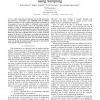Free Online Productivity Tools
i2Speak
i2Symbol
i2OCR
iTex2Img
iWeb2Print
iWeb2Shot
i2Type
iPdf2Split
iPdf2Merge
i2Bopomofo
i2Arabic
i2Style
i2Image
i2PDF
iLatex2Rtf
Sci2ools
ICDE
2010
IEEE
2010
IEEE
Estimating the compression fraction of an index using sampling
—Data compression techniques such as null suppression and dictionary compression are commonly used in today’s database systems. In order to effectively leverage compression, it is necessary to have the ability to efficiently and accurately estimate the size of an index if it were to be compressed. Such an analysis is critical if automated physical design tools are to be extended to handle compression. Several database systems today provide estimators for this problem based on random sampling. While this approach is efficient, there is no previous work that analyses its accuracy. In this paper, we analyse the problem of estimating the compressed size of an index from the point of view of worst-case guarantees. We show that the simple estimator implemented by several database systems has several “good” cases even though the estimator itself is agnostic to the internals of the specific compression algorithm.
Related Content
| Added | 17 May 2010 |
| Updated | 17 May 2010 |
| Type | Conference |
| Year | 2010 |
| Where | ICDE |
| Authors | Stratos Idreos, Raghav Kaushik, Vivek R. Narasayya, Ravishankar Ramamurthy |
Comments (0)

